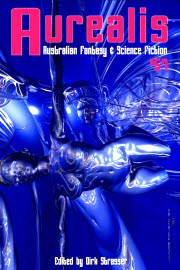Reviewed by Louis West
This issue of the Australian pro-paying ezine Aurealis contains a pair of mind-bending stories. A pleasure to read.
C.S. McMullen’s “Monday-Child” is an intriguing fantasy about the horrific cost of terribly dark magic as seen through the innocent eyes of a girl-child, Monday. Monday lives in abject poverty in a three-room hovel in the woods with her mother and four siblings, all born on precisely the correct day of the week. In her short life she’s always been hungry and has never seen anyone else, except for the scary Ms. Alexander who protects them; their home is hidden behind layers and layers of traps and concealments and encircled by a river whose course traces a five-sided ward.
All that changes after Monday’s brother, Tuesday, is born. As young as she is, Monday must now hunt for the family. On her first day out she meets a man who smells like the old blood of rabbits three-days killed. He questions her—she’d never been cautioned about talking to strangers—and the man marvels about there almost being “a complete set of Days, ripe with power, untaught and vulnerable in a guarded estate.”
Monday sees the man one more time after her mother becomes pregnant with her seventh child, Thursday. He cautions her about the “unpredictable consequences of the power of a full set of Days with characteristics as strong as her own.” Only upon Thursday’s birth, when Ms. Alexander methodically kills Monday’s mother then begins to harvest her siblings, does Monday hear the call of the power Ms. Alexander is collecting and learn how truly strong she is.
“Where Colossi Sleep,” by Daniel Baker, portrays a world deep into the decay of change brought on by the Continental Blasts, the Backlash against tech, the Breakdown and the West’s Resurgence policy. Damon, a self-described anti-AI revolutionary, is called to meet with Shiva, the faceless one who has directed his actions for all these years. Into the contradiction called Nasi he must go, an ancient city on the banks of the Ganges. Nasi, “it’s like another world with its own rules. Impenetrable, mysterious, dark, illuminated, beautiful…The city destroys you, your preconceptions, your boundaries, but it creates you too. It’s life and death, the two combined, inseparable, one reflecting the other. It breathes and pulses, a heartbeat through your feet. Alive.”
But Damon learns that Shiva represents the very thing he has fought against. Shiva, in its escape from the purges, found Nasi, was remade by Nasi with all the city’s contradictions, suffering, colour, noise, death and life. Now the Nasi-reborn Shiva transforms Damon into what he was meant to be–an avatar for the colossus itself because “Sometimes you cannot be told, you have to know, to experience. Unquantified.”
A hard read, the message drowned by the overwhelming details of the world and peoples through which Damon is rebirthed. But the story is stronger for it, its complex richness a metaphor for the very struggle of life itself. A worthy read.
———————————————-
Louis West. Sub-atomic physics, astronomy, biophysics, medical genetics and international finance all lurk in Louis’ background. He’s particularly fond of hard SF, writes reviews for a broad variety of SF&F stories and volunteers at various New England SF&F conferences. His own SF writing explores evolving nano-tech.
